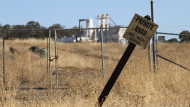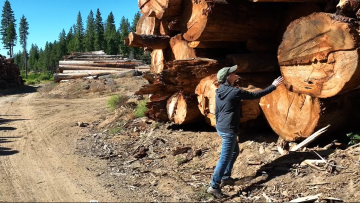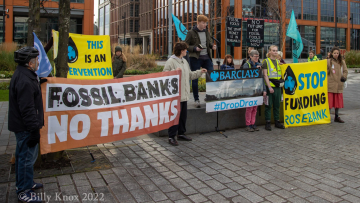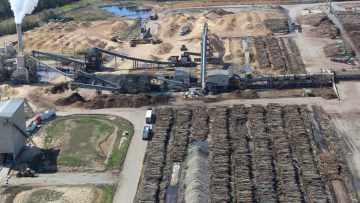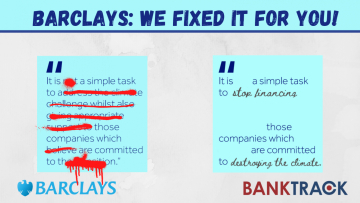Company – Active
This profile is actively maintainedBankTrack,Biofuelwatch & Environmental Paper Network
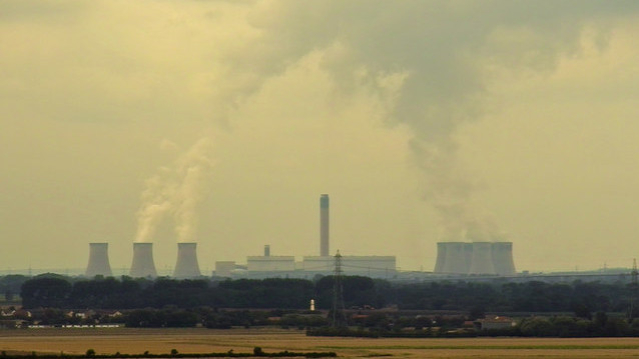
Company – Active
This profile is actively maintainedBankTrack,Biofuelwatch & Environmental Paper Network
Why this profile?
Biomass is classified, and subsidised, by the UK and other governments as renewable energy, but in reality it harms the climate, biodiversity, forests and communities. Drax is a heavy promoter of wood biomass energy and the false climate solution of Bioenergy with Carbon Capture and Storage (BECCS) worldwide.
| Take Action! |
| #AxeDrax: For Forests, Communities and the Climate! |
| Sectors | Biomass Electric Power Generation |
| Headquarters |
|
| Ownership |
listed on London Stock Exchange
Drax's largest shareholders are Invesco, Schroders plc, Blackrock and Orbis Holdings Ltd. See the Drax website here. |
| Subsidiaries | |
| Website | http://www.drax.com |
Drax is an energy company focused on electricity generation and pellet production. Drax operates the world's largest wood-burning power plant in the UK and is the world's second largest producer of wood pellets, with 13 pellet manufacturing plants located in the USA and Canada. The company produces wood pellets for its own use and for customers in Europe and Asia.
In 2019, Drax announced that it will use Bioenergy with Carbon Capture and Storage (BECCS) technology to capture the carbon dioxide it emits in an attempt to be carbon negative by 2030. It is extremely unlikely that Drax will be technologically able to fulfill this promise. BECCS has been shown not to reduce net emissions given the destruction of forests required to produce bioenergy in the first place. BECCS is considered carbon neutral due to flaws in current carbon accounting rules. There is a risk that Drax will refer to its use of BECCS as an argument to secure more funds beyond 2027, when its current subsidies run out.
Impact on human rights and communities
Environmental injustice: Wood pellet production increases air pollution, wood dust, heavy traffic and noise. Pellet mills and export facilities are often sited in communities of colour and lower income communities - who are often already exposed to other forms of industrial pollution and social exclusion. In February 2021, Drax’s Amite pellet plant in Mississippi was fined a record $2.5 million for having violated the state’s air permit for years - however, this sum is roughly equivalent to the GBP 2 million Drax is receiving every single day in 'renewable energy' subsidies from the UK government. In the Southeastern USA, Drax’s main pellet sourcing region, wood pellet plants are 50% more likely to be located in environmental justice communities (see here and here), i.e. counties where the poverty level is above the state medium, and at least 25% of the population is non-white.
Impact on climate
Drax power station is the UK’s single biggest emitter of CO2, with around 14 million tonnes of CO2 emitted in 2021, around 13.5 million tonnes of which were from burning wood. Drax claims that carbon emitted from burning wood can be ignored because new trees will eventually absorb the same amount of CO2. This flies in the face of science. In February 2021, 500 scientists wrote to world leaders, warning: “As numerous studies have shown, this burning of wood will increase warming for decades to centuries. That is true even when the wood replaces coal, oil or natural gas.” In the same month, 87 scientists and economists warned the UK government: “Forest bioenergy is adding increasingly large amounts of carbon dioxide to the atmosphere and reducing the capacity of forests to absorb atmospheric carbon dioxide, making it more difficult to reach net zero carbon as the stated goal for limiting global temperature. Adding carbon capture and storage (CCS) technology to a bioenergy plant does not resolve this issue.” In October 2021, rating agency S&P removed Drax from its Global Clean Energy Index for failing to comply with their carbon standard.
Impact on nature and environment
Forest destruction: Drax burns the equivalent of 138% of the UK’s total annual wood production. Its main sourcing regions are the Southeastern US, Canada and the Baltic States. Furthermore, since its takeover of Pinnacle Renewable Energy in 2021, Drax has become the world's second biggest producer of wood pellets. Those pellets are burned in Drax's own power station in England as well as being sold to other energy companies in the UK, Netherlands and Japan. All of Drax's existing and planned pellet plants are located in the Southeaster US and Canada.
According to Drax, the creation of more spaced and less dense forest is necessary to avert forest fires, and pests and diseases. However, such claims have been perceived to justify more logging in 'natural and highly biodiverse forest ecosystems' by timber industries. Research has proven otherwise; as old growth and primary forests are more resilient to 'forest fires and pest and diseases'.
In the US, Drax' biggest external wood pellet supplier is also the world's biggest pellet producer - Enviva. Enviva has been heavily criticised for regularly sourcing wood from clearcut coastal hardwood forests in the Southern US. As well as being home to black bears, salamanders and many bird species, these forests offer crucial protection from extreme weather events such as floods and droughts that are becoming increasingly common. While Drax and Enviva claim to use 'waste wood' and 'forest residues' for wood pellets, these terms refer primarily to the economic value of wood, and pelletising of whole trees is standard practice.
Drax owns five pellet mills in the Southeastern US with two more under development. Wood for those plants is sourced mainly from monoculture pine plantations. Across the region, such plantations have been expanded at the expense of the rich forest ecosystems that are being clearcut. According to a study commissioned by the Southern Environmental Law Center, burning pellets from US pine plantations in the UK will be worse for the climate than the UK’s average electricity for a period of at least 40 years.
Following its acquisition of Pinnacle Pellets, Drax now owns seven pellet mills in British Columbia and Alberta. Those plants are located next to some of the last stands of primary forests in British Columbia, Canada, home to endangered wildlife like caribou and among the most carbon-rich in the world. Drax admits in its 2021 Annual Report that those plants "operate in regions that include old growth forests" and that it will stop sourcing from such forests only if a provincial government review requires them to do so in future.
In Estonia and Latvia, logging volumes have been increasing sharply as demand for wood, including for wood pellets for exports, has gone up. Logging is happening even in the few remaining old-growth forests, destroying habitat of rare and endangered species including Capercaillie, Black stork and Hazel grouse. In Estonia, the number of forest birds is declining by 50,000 breeding pairs year on year. In July 2021, a report by the Centre for Research on Multinational Corporations (SOMO) commissioned by Greenpeace Netherlands, exposed “logging in high conservation value forest (HCVF) areas, logging in watersheds and logging in peatland forests” in Estonia, all of them associated with Drax’s pellet supplier Graanul Invest.
Impact on pandemics
Wood biomass is associated with high rates of deforestation as well as monocultures of various crops. There is a growing body of evidence that shows the connection between deforestation and an increased risk for disease outbreaks and pandemics. For example, monocultures like eucalyptus plantations reduce biodiversity leaving species like rats and mosquitoes, which are more likely to spread dangerous pathogens, to thrive. This biodiversity decline results in a loss of natural disease regulation and poses a risk for human, animal and environmental health.
Other impacts
Flawed claims around Carbon Capture and Storage: In May 2022, Drax submitted a planning application for installing carbon capture equipment at two of its biomass units. A decision on the application is expected, earliest, at the end of 2022. The National Grid plans to build a carbon dioxide pipeline which would connect Drax power station as well as various fossil fuel sits, and a consortium of oil and gas companies has already got consent to inject CO2 from that pipeline under the North Sea.
However, there are good reasons to doubt that Drax is capable of capturing large quantities of CO2 from burning biomass: there is no example that demonstrates carbon capture from biomass combustion at scale is possible. It is widely accepted that all new technologies go through several technology readiness levels, yet Drax proposes to skip several of those development stages. So far, Drax has been involved in just two small-scale carbon capture trials. In 2018, Drax partnered with a start-up company called C-Capture to trial capturing one tonne of CO2 a day from biomass burning, financed by millions of pounds in government grants. This project failed, and, in March 2021, Drax described C-Capture’s technology as not proven. In June 2020, Drax announced a new carbon capture partnership with Mitsubishi Heavy Industries (MHI) whose novel solvent Drax wants to use for capturing CO2 at scale. However, the trial so far has only captured 300kg of CO2 a day and this is not over a continous period. All CO2 that has been captured has subsequently been released into the atmosphere and no actual reuslts from the trial have been published.
Beyond this very small and unpublished trial, CO2 capture from wood combustion has not been demonstrated anywhere in the world. On a nine-stage technology readiness level ladder, the CCS from wood combustion technology has reached stage 4 or 5. Stages 5-8 are considered essential prior to full commercial application. This makes it all but inconceivable that Drax would be able to operate one, let alone two of their large biomass units with full carbon capture and storage from 2027/28, as they propose.
Campaigning groups like Biofuelwatch is concerned that the main purpose of Drax's planning application for BECCS could be to convince the UK government to grant them further subsidies once the current ones expire in 2027.
Financial institutions have financed Drax via bond and share issuances as well as through shareholdings. See below for a specified overview of financial institutions involved.
In its Annual Report (2020), Barclays, Royal Bank of Canada and JPMorgan Chase are mentioned as Drax's banker (Barclays) and brokers.
From pine forest to power station (full version)
Biofuelwatch and ZERO have just released a video investigation into wood sourcing by the Pinewells pellet plant in Central Portugal, whose biggest customer is Drax: https://www.biofuelwatch.org.uk/2024/drax-pinewells-investigation/. Pinewells, which belongs to the Portuguese Grupo Visabeira, uses large quantities of roundwood from mature pine. The video presents evidence of Pinewells having sourced some of the wood from clearcuts in the mountainous Serra da Lousã nature reserve and Natura 2000 site. The video also looks at the wider impacts of the large-scale use of pine wood for wood pellets on pine forests and on wood products industries in Portugal. According to figures by the pine wood industry association Centro PINUS (Pine Centre), Portugal lost 27% of its pine forest area and 35% in terms of the productivity of pine forests in 15 years. 20% of all pinewood goes to wood pellets, making it the second largest consumer of pine in the country.
Our message to world leaders: Cut ties with Drax' "Green Energy Scandal"
2025
2025-04-08 00:00:00 | Major Win for Communities in Mississippi and the South-Permitting Board Denies Drax Expansion in Gloster
British wood pellet manufacturing giant, Drax, was denied its request to increase pollution in Gloster, Mississippi. What was anticipated to be a routine approval for the company was decisively rejected by the permit board. Drax had applied for permission to increase emissions at a facility already fined several times for pollution violations. In response, community members and advocates—who have long opposed the facility—showed up in force at the hearing, urging the board to reject the application. Following a lengthy hearing and thorough deliberation, the board denied the permit, with five out of six members voting against it and one abstaining. This outcome marks a significant victory, achieved through years of dedicated grassroots organizing.
According to the decision of the permit board, Drax was denied based on its past compliance history and the understanding that the company would likely exceed pollution limits even with this new permit. It has 15 days to appeal the decision.
2025-02-10 00:00:00 | UK Government approved future subsidies for Drax
The UK government has decided to extend subsidies for Drax's biomass power stations beyond 2027, providing up to £2 billion to continue burning wood for energy between 2027 and 2031 while reducing the plant's operations to less than half of its current production levels. Under the new terms, Drax will be supported to operate its biomass power station in Yorkshire at a maximum load factor of 27%, generating biomass power less than half as often as it currently does. This move aims to position it more as a backup energy source. This is also expected to reduce Drax’s subsidies by approximately 50% compared to current levels.
Despite the reduced operational capacity, Drax will receive a guaranteed price of £154 per megawatt hour in today’s prices, which is higher than the rates for wind or solar energy. The agreement introduces stricter sustainability rules, requiring all biomass to be sourced from 100% sustainable sources, explicitly banning materials from primary or old-growth forests, with financial penalties for non-compliance.
Environmental campaign groups such as Biofuelwatch and the Environmental Paper Network have consistently called for an end to new subsidies for wood-burning power stations in the UK. As studies have shown, Britain’s energy needs could be met entirely by wind and solar, and continued support for biomass results in more trees being harvested for fuel and carbon emissions undermining UK climate goals.
2024
2024-11-27 00:00:00 | Drax-owned facilities broke environmental rules more than 11,000 times in the US
An investigation by the Land and Climate Review has found that Drax has breached environmental regulations over 11.000 times since 2014. This concerns six Drax-owned pellet mills in the U.S. The majority of violations were regarding air pollution, for example exceeding limits for the release of toxic air pollutants. According to the Times, "of the 11,378 violations since 2014, more than 8,700 took place since the start of 2020 — an average of five environmental breaches per day". Scrutiny of Drax's lacking environmental protocols may affect its access to the UK's generous green subsidies, which it is heavily reliant upon. For scale, Drax has paid a total of $6.1 million in environmental fines since 2019. This is largely outweighed by the £548 million it received in subsidies in 2023.
2024-05-06 00:00:00 | Drax joined GSNR to build two of the biggest wood pellet mills in the United States
The Mongabay reported, that Golden State Natural Resources (GSNR), a California state-funded nonprofit focused on rural economic development, along with the U.K.’s Drax, a global maker of biomass for energy, have signed an agreement to move ahead on a California project to build two of the biggest wood pellet mills in the United States. The mills, if approved by the state, would produce 1 million tons of pellets for export annually to Japan and South Korea, where they would be burned in converted coal power plants. The pellet mills would represent a major expansion of U.S. biomass production outside the U.S. Southeast, where most pellet making has been centered. This will add to the severe stress on California's forested landscapes with biodiversity and water resources already at risk, and climate change adding further challenges to forest recovery.
2024-02-28 00:00:00 | Investors seeking compensation from Drax over greenwashing, inflated share values
Mishcon de Reya, a British international law firm is investigating a potential group shareholder action against Drax Group Plc (Drax), over false environmental claims. Shareholders claim that Drax's portrayal of its sustainability practices and the environmental benefits of its biomass energy was misleading, leading to inflated share values. Overvaluation of share prices was also a concern for Citi, leading it to downgrade Drax shares to "sell" earlier in January. Recent bad publicity, including a BBC Panorama report, exposed Drax's greenwashing causing drops in share prices drops brought significant losses to shareholders. Despite Drax's claims of using sustainable wood sources for biomass, investigations suggest otherwise. Drax's CEO admitted that the company is the largest emitter of CO2 in the UK. Additionally, Drax is sourcing its wood from old-growth forests in Canada, despite claiming that the wood used in its biomass pellets is derived from wholly sustainable sources. The focus of this investigation is not just on financial compensation but also on upholding integrity in sustainable investing and adds to the reputational and financial risk of Drax.
2023
2023-04-26 00:00:00 | Power giant Drax told by own advisers to stop calling biomass 'carbon neutral'
Drax has been told by its independent advisory board to "reassess its criteria for determining carbon neutrality", according to a summary of meetings and correspondence last year."Drax should move away from saying 'carbon stocks are increasing/stable' and stating biomass is carbon neutral," added the board, chaired by former government chief scientific adviser Professor Sir John Beddington.
The UK government currently classes bioenergy as renewable. This qualifies Drax for subsidies of around £1.7 million a day for providing about 6% of the country's electricity. The government is anticipated to unveil its overdue strategy on biomass by the end of June, which will also include a determination on additional subsidies to Drax.
2022
2022-07-27 00:00:00 | OECD watchdog advances greenwashing complaint against biomass giant Drax
A landmark complaint alleging that UK wood-burning electricity generator Drax misleads consumers about its climate impacts will proceed to the next stage of consideration, according to a decision published by the UK's National Contact Point (UK NCP). The complaint alleges that Drax’s claims to generate “carbon neutral” electricity by burning trees and other forest wood violates OECD Guidelines for Multinational Enterprises on Responsible Business Conduct.
2022-06-28 00:00:00 | Drax is lobbying the Californian government to allow it to build the world’s largest bioenergy with carbon capture and storage (BECCS) plant.
BECCS is a controversial and unproven technology and the news has been met with criticism from anti-biomass campaigners. Gary Hughes from Biofuelwatch argued that Drax was “riding roughshod” over concerns raised by environmental justice campaigners and said that “Drax is trying to take advantage of the policy landscape to see if the plant comes to fruition. Even though this isn’t a concrete proposal, it could prove a conceptual win for Drax,” he added. “It wants California to promote BECCS – and if it can say the ‘global climate leader’ California is on board, they think others will follow.” Read the full article here.
2022-03-28 00:00:00 | New study confirms harmful impacts of biomass industry
A new study, commissioned by SELC, clearly shows the environmental and climate harms the biomass energy industry inflicts on forests in North Carolina and Virginia. For the study, researchers from Clark University used satellite images to evaluate the amount of forest cover lost near four wood pellet plants owned by Enviva, the largest wood pellet manufacturer in the world and supplier to Drax in the UK. Researchers found that logging in the sourcing areas near the four pellet mills sharply increased after Enviva began operating the plants. In 2019, Forest Service data shows that more than 6.6 million green tons of forest were cut for bioenergy or fuelwood in these areas. That’s the equivalent of 71,000 acres of forests cut, with Enviva being a primary user of this wood. Furthermore, the study showed that from 2016 to 2018, Enviva’s Ahoskie, Northampton, and Southampton pellet mills consumed nearly half of the wood from hardwood forest clearings in the sourcing area. Cutting forests at this scale can degrade water quality for communities downstream and destroy wildlife habitats, further threatening at-risk species. For more information see here.

